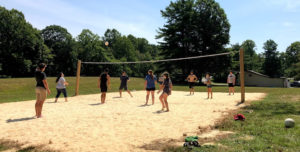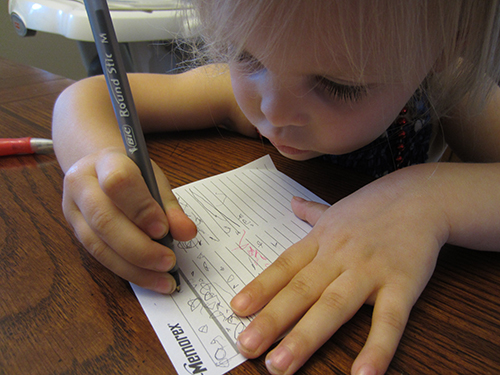
Seven Ways to Get Kids Excited about Back to School
 by Christina Brown, August 2021
by Christina Brown, August 2021
Back to school is different for kids who go to traditional schools: backpacks, locker chandeliers, and the school list that we spy moms trying to fill at the local Walmart. These traditions don’t always work for those of us who school in our PJs.
I wanted my girls to look forward to back-to-school. Here are some ideas I found that got them excited, and me too!
1. Take pictures on the first day. Go outside. Pictures always look better outside. Don’t be a perfectionist. Try to catch your kids’ personalities. Tell them in advance so they can plan what to wear. Don’t rush. Let them pose. Be silly—no rules!
2. Put together back to homeschool bags for the first day of school. My kids look forward to this every year. I use pretty or colored gift bags, but you could use backpacks or paper lunch bags as well. Ask your kids what they would like for school.
For preschoolers to high schoolers, here are some ideas for things you can include in the bags: gum, candy, sharpened pencils, markers, crayons, their own paper, a journal, stationary, glue sticks, colored pencils, erasers, games, sharpeners, Legos, hair clips, Pez candy and dispensers, Lifesavers, chocolate, socks, pocket knife, snacks, notebooks, calculator, cool pens, punching balloons, shaving cream, a special razor, crafts, coupon for classes they want to take, makeup, nail polish, dollar bills, coupon to a coffee house or coffee, homemade coupons, special drinks, and that little something you usually do not let them have. My youngest wanted vitamin water. Who knew?
3. Write a letter to your child. You can mention things you are looking forward to this year, character issues you are proud of and ones that need work, a Bible verse for encouragement, thoughts on the new school year, and anything else you would like your child to remember. I have done this every year, and what memories they hold! Many of these I would have forgotten.
4. Confer with your kids to find out what they would like to study during the year. Buy a book or check one out from the library on the subject and incorporate it into your studies. For example, we saw a shark at the beach one summer, and my youngest was interested in sharks that year. Investigate things that align with your child’s bent. And start slow, don’t do every subject the first week.
5. Ask your kids what they would like to do for the school year. What would they want to accomplish or try? This is like creating a school year bucket list of goals: field trips, mission trips, theater productions, movies, games, sports, 5Ks, camping, friend dates, etc. We keep these on large index cards and go through them throughout the year to see if we hit our goals.
6. Plan a special lunch or breakfast for the first day. Sometimes I need a kick start to get inspired. My girls had their ideas about what kind of meal would be special for them.
7. The best way I have found to get my kids looking forward to back-to-school is for me to look forward to it. Get organized. Pray. Make it special. Mention it often. We are so blessed with this opportunity to homeschool; it is infectious to show gratitude (by our actions and the words that come out of our mouths), for just how blessed we are!
Here is to a successful, prosperous, and most excellent year! Cheers!
 Christina Parker Brown is a homeschool momma of three (two she graduated) and the author of AKAHomeschoolMom.com, Yard Sale Secrets for Buyers and Sellers, Alphabet Smash, and My Adventure Book. She loves pictures, is a hopeless logophile, and always brakes for yard sales. Christina has homeschooled over twenty-one years and co-moderates the largest online Christian homeschool support group in Charlotte, CCHNET. Christina’s passion is to encourage others to intentionally connect faith, family, and fun.
Christina Parker Brown is a homeschool momma of three (two she graduated) and the author of AKAHomeschoolMom.com, Yard Sale Secrets for Buyers and Sellers, Alphabet Smash, and My Adventure Book. She loves pictures, is a hopeless logophile, and always brakes for yard sales. Christina has homeschooled over twenty-one years and co-moderates the largest online Christian homeschool support group in Charlotte, CCHNET. Christina’s passion is to encourage others to intentionally connect faith, family, and fun.
Reasons to Homeschool: Strong Family Life and Relationships
by Matthew McDill, August 2021
 My dad always used to tell my sister and me: “You’ve got to learn to get along with each other. You two are best friends.” We would often make faces and deny this, but in the end, my sister and I were very good friends. This is the spirit in which my wife and I have raised our kids as well. Public school kids, like my sister and I, can certainly develop strong relationships. But there are some extra benefits and opportunities for strong family life and relationships when we homeschool.
My dad always used to tell my sister and me: “You’ve got to learn to get along with each other. You two are best friends.” We would often make faces and deny this, but in the end, my sister and I were very good friends. This is the spirit in which my wife and I have raised our kids as well. Public school kids, like my sister and I, can certainly develop strong relationships. But there are some extra benefits and opportunities for strong family life and relationships when we homeschool.
Homeschool families usually develop close relationships because they spend more time together. They learn together, work together, play together, and eat together more than the average family. Spending more time together also presents its challenges. There is often yelling and fighting between siblings. I have heard some parents say that they put their children back in school because they could not get along with them. They said it was hard enough to be their parent; they couldn’t be their teacher as well. This is understandable because it is very challenging to spend a lot of time with people, living and working with them. But if we do not give up but grow through these challenges, we can learn how to love one another and enjoy strong relationships with each other. It is worth it!
We’ve had plenty of fights at our house between siblings and between parents and children. One of the lessons we have learned and taught our children is how to resolve conflict in a healthy way. Instead of lots of yelling, hitting, and tattling, we teach them another way. There are three simple steps: 1) Ask nicely; 2) If he won’t listen, warn him that you are going to tell a parent; 3) If there is still no response, go tell a parent.
 If there is any yelling or hitting at our house, the one yelling and hitting gets in trouble no matter what the other offense may be. The most important issue is that they learn to talk with each other about their problems. When a child tells on a sibling, my first question is always, “Did you talk nicely to him or her about it?” If not, I will not listen to the child’s complaint. If they have, then I handle it in the fairest way possible. Sometimes I even have to call witnesses. The children quickly understand what the rules and expectations are. They learn not to come to parents if they haven’t tried to work it out among themselves. They learn what is right and wrong and only bring issues they believe to be right. They learn to listen to each other.
If there is any yelling or hitting at our house, the one yelling and hitting gets in trouble no matter what the other offense may be. The most important issue is that they learn to talk with each other about their problems. When a child tells on a sibling, my first question is always, “Did you talk nicely to him or her about it?” If not, I will not listen to the child’s complaint. If they have, then I handle it in the fairest way possible. Sometimes I even have to call witnesses. The children quickly understand what the rules and expectations are. They learn not to come to parents if they haven’t tried to work it out among themselves. They learn what is right and wrong and only bring issues they believe to be right. They learn to listen to each other.
When families learn how to love one another and live life together, there is such wonderful fruit in the relationships that are built. I was recently able to enjoy this relational fruit when my family went on a camping trip. My oldest daughter and her husband and my two boys in college met Dana, me, and the six kids still living at home at a campground in the mountains. What a fun time! We had enough people to play volleyball as a family. We played in the lake, ate lots of food, roasted marshmallows, sang around the campfire, laughed, encouraged each other, and had lots of one-on-one conversations. I love seeing my little boys look up to their older brothers as their heroes and seeing my older boys play with and talk to their little brothers. I love seeing brothers hug their sisters and encourage them. I love seeing my teens talk to their older siblings and ask them for advice.
 This kind of fruit comes by working through a lot of difficulties and many years of investment and growth. The years go by so fast. We captured that reality on this trip when my oldest daughter and son recreated a picture that we took almost twenty years ago in the exact same campground.
This kind of fruit comes by working through a lot of difficulties and many years of investment and growth. The years go by so fast. We captured that reality on this trip when my oldest daughter and son recreated a picture that we took almost twenty years ago in the exact same campground.
We are so thankful to God for our children, for homeschooling, and for the strong family life and relationships we have been able to build over the years.
Reasons to Homeschool: Sharing of Faith and Values
 by Matthew McDill, Aug 2021
by Matthew McDill, Aug 2021
Some of my very favorite times as a dad are when I sit with my teens, enjoying some coffee and real-life conversation. We talk about school, work, relationships, faith, the Bible, the world, philosophy, politics, and anything else they have on their mind. There is nothing more rewarding than to see their spiritual and intellectual hunger grow, be satisfied, and continue to grow. Of course, this journey started long before they were teens. We teach our little ones basic truths about God and the Bible. We teach them about creation, the fall, salvation in Christ, and the coming judgment. We explain how these basic truths impact every aspect of life.
Many parents choose to homeschool for this very reason: to teach their faith and values to their children. This goal makes sense from a biblical perspective because parents are explicitly given the responsibility to pass on faith and love for God (Deuteronomy 6:4-9; Ephesians 6:4). This goal makes sense from a constitutional and legal perspective because of the principles of religious freedom and parental authority. Unfortunately, many parents have abdicated this responsibility completely to the church or the school system. And the public school system seems to be happy to take this responsibility away from parents. Home education is an excellent path for accepting and fulfilling the parental responsibility of passing on faith and values to our children. I want to explore three reasons why this is true.
Preparation for life requires more than knowledge.
When I was in public school in Beaverton, OR, my mom had us come home early from school every Thursday. During that time, we had what she called “wisdom class.” She knew that we were gaining some knowledge at school, but she also knew that we were not sufficiently gaining wisdom there.
Knowing stuff is not the most important thing about us. Knowledge is undoubtedly important and necessary, but there is more. When we use knowledge rightly, it is called wisdom. We have historical examples of some very well-educated, brilliant people who were also horribly evil. The question is: What will our children do with their knowledge? The answer to this question comes from their values and character. In home education, we have the freedom to teach content that goes well beyond knowledge. We can spend significant amounts of time focusing on faith, values, and building character.
Education is rooted in worldview.
Where did the world and humanity come from? What is the meaning of life? What is right and wrong? What happens after we die? The answers to these questions are the foundation for how we understand the world. Everything we learn and receive as true has worldview implications. Our system of values and the decisions we make through life are based on our worldview. Therefore, we must recognize that children are not just receiving information at school but an entire perspective and philosophy of life. Many parents choose to homeschool today because it has become evident that the worldview being taught in public school directly undermines their family’s faith and values. Some areas of study that are most heavily impacted by worldview include science, history, social studies, and sex education. Homeschooling provides the opportunity for parents to teach every subject from a perspective that supports their faith and values.
Discipleship is built on time and relationship.
Discipleship is helping others to follow Jesus Christ. The goal is not to brainwash our children but to guide them to make their own personal choice to believe and follow Christ. Discipleship doesn’t come from discipline or primarily from giving information; it comes from living real life with our children. A parent who wants to help their children follow Christ will spend time with them and develop strong relationships with them. Effective discipleship takes place in the context of open, trusting relationships. Home education provides a wonderful context in which to develop those relationships as families eat together, play together, learn together, and explore and discuss life together.
We are so thankful for the opportunity to pass on faith and values to our children through homeschooling. If this is your goal, please take advantage of these resources that will equip you to do so.
Reasons to Homeschool: Positive Socialization and Character Development
 by Diane Helfrich, August 2021
by Diane Helfrich, August 2021
Once a child enters our lives, we start thinking about the years to come—their first words and steps turn into school, graduation, and college, and then, we hope, a successful launch to adulthood. Part of how well our child negotiates these steps has to do with who they spend the most time with, what they read, take in through media and games, and, most importantly, what they are taught., One of my favorite Christian leadership authors, John Maxwell, says, “Talent is a gift, but character is a choice.” Let’s look at the difference between a traditional school and a homeschool in its effect on character development.
Who does your child have the most association with beginning at age five or six? In a traditional school, they are placed in a room with twenty or thirty students of the same age and one or two adults for roughly seven to eight hours a day. They will likely interact with other adults throughout the week as they go to art, music, PE, or the library, but most of their time is in the classroom with same-aged kids who have the same-aged social skills. This situation will likely be the norm for the next thirteen years. Think of the behaviors learned there. Sure, there are many well-behaved kids, and the teacher is doing her best, but there are also mean kids, bored kids, kids from families with very different social expectations than yours, kids that hate school, and kids that say things you really don’t want to hear. The majority of behaviors our children absorb come from people in their environment—social learning.
According to Frontiers for Young Minds, there are a couple of types of social learning. One stems from watching others, observing their choices and actions and the ensuing repercussions of those actions, be they good or bad. A second type of social learning focuses on how people behave. It’s where we begin to understand the concepts of trustworthiness and believability. Who backs us up? Who comes to our aid? Who betrays us? Between these types of learning, we decide how to act and how to interpret our world. Now, let’s think back to the classroom where our kids learn these critical concepts primarily from other kids at roughly the same maturity level.
It’s also not just who we hang with, but the amount of negative behavior around us that forms our attitudes. According to Very Well Mind, “Because negative information causes a surge in activity in a critical information processing area of the brain, our behaviors and attitudes tend to be shaped more powerfully by bad news, experiences, and information.” That doesn’t bode well if you are around negative behaviors! We are, unfortunately, drawn to bad behavior. If we are drawn to it and around it, there is a strong likelihood that we will absorb it.
Now, let’s look at homeschooling. Who is the primary association with? It’s probably Mom or Dad and some siblings. Then, hopefully, there is a homeschool group or co-op where we meet with others maybe once a week or so and may even have a more traditional classroom environment. There is also our church, the library, the homeschool chess group, the soccer team, etc. There are significantly more adults in all of these not-at-home activities because pretty much every child has a parent there. There are preschoolers mixed with elementary, blended with middle schoolers, even combined with high schoolers. So, in the week of a homeschooled student, most of the time will be with family, and group time will be with a range of ages and other adults instead of mostly same-aged kids. Social learning occurs at a more advanced level because of the rich mix of people—which influences the ability to relate to people of various ages. In comparison, would you prefer your child learn social behavior from kids the same age over whom you have no control, or would you rather they learn social behavior from you and adults you choose and trust? With traditional schooling, it’s not that parents don’t have influence, but the waking hours at home are significantly less than the hours they spend with peers at school.
Of course, it goes far beyond just social learning. In your homeschool, you have the opportunity to mold character in the framework of your beliefs. You choose curricula that support your belief system. If you are a Christian, you can weave those values into your daily work with your children—you teach values and set the expectations. You can raise your children knowing the importance of sharing and providing service to others. You have time that the school system doesn’t have to talk about the value of good character and what it means in relationships with others. In your homeschool, you may have more ability to build strong relationships with grandparents, aunts and uncles, and close family friends and reinforce the values of respect and caring through time spent together. In your homeschool, you, as the parent, decide and teach what constitutes good character.
In my article about academic success earlier in this blog series, I fronted research showing adults who have been homeschooled are statistically more successful, participate in more community service, participate in civic responsibilities such as elections, and tend to be more likely to have strong family values and beliefs of their parents (nheri). Why? Because social learning is taking place in the realm where the values you express through daily living are most prevalent—your home! They are modeling you. In hindsight, I feel like my children’s success is far more about who we were as parents than about what we asked them to learn. We value hard work, honesty, integrity, responsible financial management, respect for others, family mealtime… as do they! Even if we didn’t intentionally teach that, they observed it and modeled it, as did most of the people we surrounded ourselves with outside of our home.
Yes, what surrounds us affects our character. We must take care in our decisions about what our children are exposed to in life. Finally, Proverbs 13:20 says, “Whoever walks with the wise becomes wise, but the companion of fools suffers harm.”
Reasons to Homeschool: Flexibility
 by Jessica Frierson, August 2021
by Jessica Frierson, August 2021
If I were to sum up the essence of homeschooling in one word, it would be flexibility. Every aspect of the homeschool can benefit from the flexibility it offers. The scheduling of both your school year and school day, the selection of materials used, the subjects taught, and the teaching method vary as greatly from one family to another as the dynamics of each family vary from the other.
As I have written about previously, you can adjust your school calendar to suit your family’s preferences. Some options are a year-round schedule, a program that follows a more traditional timetable, or a customized plan. In addition, you can tailor the structure of the homeschool day to fit the needs of each child. Over the years, we have planned our school week in various ways. When I only had small children, we did school Monday through Thursday. I used Friday for catching up on housework and washing diapers. Later, when I had both teens and babies (and everything in between!), Fridays were for sports and outside activities, while Mondays became the day for self-directed studies. My older ones took turns playing with a toddler, and I paid bills, checked schoolwork from the previous week, and planned the menu for the week.
For one family I know, the father works night shifts. The mother schedules park-time, 4-H club, library trips, and music lessons for the hours when Dad is trying to sleep in the mornings. Afternoons are family-time and the beginning of their school day. The flexibility of homeschool allows their family to spend more time together by planning their school day around their specific needs.
A great deal of time is occupied in a conventional classroom on such activities as lining up, getting everyone’s attention, or walking to the lunchroom. The teacher must accommodate the needs of all of her students. When the superfluous fillers are stripped away as they are in the homeschool, most families find that far less time is needed for school. Depending on the child’s age, my children are finished with their textbook learning within two hours for the younger ones and up to five hours for my high-schoolers. The remainder of their day can be spent on creative play, the pursuit of hobbies, or reading for pleasure.
Without the constraints of teaching to an end-of-grade test, we can move along in each of my children’s subjects at a pace that is best suited for them. They may be in a seventh grade math book, an eighth grade reader, and a science class with mixed ages. They can take the necessary time to work on a concept to fully comprehend it and skip ahead when the material is redundant. The need for sticking with grade levels is eliminated. As the administrator of my homeschool, I can customize the courses my children take in whatever manner I believe is best for them. I also determine what the standards will be for each child to graduate. In short, a homeschool education is a completely personalized educational program.
There is a seemingly endless supply of homeschool resources and curricula available, including many that are free. Depending on the needs and desires of the teaching parent, you can purchase a full curriculum from one publisher that includes everything from student textbooks to lesson plans, or you can pick and choose individual books for each subject from different publishers. Many families choose to not use any curriculum at all, utilizing online resources or the public library. In addition, if you try one way and change your mind, you have the flexibility to ditch it and go in another direction. I have not made it through very many school years without making at least one curriculum change somewhere along the way. My children gain confidence by knowing that if one approach we’ve taken to a subject isn’t working well for them, we will find another one that does. This ability to adjust has helped them acquire skills they may have otherwise been intimidated or too discouraged to pursue.
There are many aspects of homeschooling that make it both successful and enjoyable. The flexibility it gives sold me on the idea of it when I was a high school junior. Years later, it was a summation of the reasons I gave my husband for homeschooling our children. After twenty-one years of teaching my children, it remains the spark that fires me up at the approach of each new school season.
Reasons to Homeschool: Creativity Stimulated and Encouraged
by Jessica Frierson, August 2021
 Of the many reasons our family chose to homeschool, creativity is my favorite. Unlike traditional classrooms, the homeschool environment is particularly conducive to encouraging and inspiring creativity. Just as in a greenhouse where tender plants are coaxed and nourished with the goal of bearing luscious fruit or beautiful flowers, our children’s education is nurtured to bring out the hidden talents and skills within them.
Of the many reasons our family chose to homeschool, creativity is my favorite. Unlike traditional classrooms, the homeschool environment is particularly conducive to encouraging and inspiring creativity. Just as in a greenhouse where tender plants are coaxed and nourished with the goal of bearing luscious fruit or beautiful flowers, our children’s education is nurtured to bring out the hidden talents and skills within them.
Many people limit the concept of creativity to areas of the arts. Others might define it as imagination. Richard Foster, Yale lecturer and emeritus director of McKinsey & Company, has made a study of creativity, concluding that it is about making something new. “When you find one creative idea,” he says, “more often than not it triggers other ideas in the same fashion.” Homeschool parents commonly see this domino effect when their children are permitted to explore their interests and encouraged to follow the ideas they devise in the free environment homeschooling provides.
Foster continues, “A key to being creative is the ability to find associations between different fields of knowledge, especially ones that appear radically different at first.” This thought is a wonderful description of the popular homeschool method of unit studies. Unit studies are available on a myriad of subjects, but our personal family favorites have begun with my children asking questions about one topic that led to another. Trips to the library, streaming videos, and stacks of books later, we often complete our spontaneous investigation with a family presentation. The creative juices stirred up may result in art projects, LEGO constructions, a re-enactment with Playmobil, or a PowerPoint slideshow. The current theme of our school week is often evidenced by the apparel my younger children devise for themselves. It is not unusual to see a tribe of Indians, a group of Pilgrims, a company of soldiers, or a menagerie of “animals” running through our yard. My thoughts of “What will the neighbors think?” were dispelled when one confided in me that they were quite envious of the adventurous schooling my children experienced and the joy it brought as they observed it.
David Elkind, a renowned psychologist, emphasizes the value of creative play. “Decades of research has shown that play is crucial to physical, intellectual, and social-emotional development at all ages. This is especially true of the purest form of play: the unstructured, self-motivated, imaginative, independent kind, where children initiate their own games and even invent their own rules.”
The biological explanation for creativity is shared by Dr. Jonathan Fineberg of the University of the Arts in Philadelphia: “Humans take in so much information from the world around us—sights, smells, sounds, and more. Creativity is about being able to put those pieces together in a new way.” Free from classroom restrictions—sit still, line up, don’t talk without raising your hand, keep your thoughts to yourself—the homeschool student can freely process information and give impetus to inspiration as it hits. As they turn from studies to play, the knowledge learned is reorganized in their minds and spurs them on to create new ideas using that knowledge.
Research backs this up, and studies done to compare the levels of creativity of homeschoolers to their public school counterparts showed superiority on all three kinds of creativity measured in the homeschooled students. In fact, the creativity displayed in math concepts increased in relation to the number of years the children were homeschooled. Researchers believe the reason for that lies in that the teaching methods employed by the homeschool parent “promote math creativity by encouraging independence and a game-like approach to problem-solving.”
When presenting new math concepts with my children, I often turn them into a game; it makes it more enjoyable and creates a sense of intrigue in their minds as they are working on the problems. As they look beyond the numbers on the page, their interest is aroused, and they are motivated to investigate for themselves how math works in the world around them. In today’s technology-centered world, creativity in math and science is a more valuable commodity than rote memorization of facts.
Another advantage of the home classroom is the freedom to move around frequently. What would be disruptive in a conventional classroom is normal activity in a home. Not only is this much more enjoyable for children, but it also has a correlation with their academic achievement. Math and reading are affected by physical activity because they depend on efficient, effective executive function, which is enhanced with physical activity, as noted by the National Institute of Health.
A common critique of homeschooling is that the child will miss out on so many opportunities. Ironically, with cuts that schools have made in things like recess, music, art, and physical education, many homeschooled students have an abundance of creative outlets unavailable to them in a conventional school. Freedom from the constraints necessary in an institutional setting opens the doors wide for creative expression. The fruit of this may be revealed in a beautiful work of art, a tasty culinary concoction, the development of a computer app—or maybe even a future medical breakthrough! There is no limit to the depth of creative potential residing in our children’s minds so let us not limit their pathways to discovery.
Reasons to Homeschool: Academic Success
 by Diane Helfrich, August 2021
by Diane Helfrich, August 2021
“Education is not the filling of a pail, but the lighting of a fire.” William Butler Yeats
In a nutshell, this describes for me the difference between homeschooling and public education. We discover and feed gifts and passions in our children, lighting fires to carry them into adulthood and lifelong learning. We don’t just fill buckets—we light fires!
When our son was in elementary school, I started looking at schooling alternatives. Homeschooling was a choice, but initially, I didn’t consider it. I wasn’t confident of how to do it, and like many, I was petrified of ruining my children’s lives. Would they be successful students, college students, or adults? One day, I said something to the woman at the library checkout desk about considering homeschooling. She was a homeschooler, and she filled me with information that sounded inordinately exciting. A few weeks later, I read an article about how schools like Harvard and Stanford actively recruited homeschoolers. It was an answer to prayer, and my decision was easy. We opened our homeschool and left the public system for good.
I have since learned the many benefits of homeschooling. But, it’s not just what I think; it’s what the research shows. According to Chris Weller in a Business Insider article from January 21, 2018,
Research suggests homeschooled children tend to do better on standardized tests, stick around longer in college, and do better once they’re enrolled. A 2009 study showed that the proportion of homeschoolers who graduated from college was about 67%, while among public school students it was 59%.
The Oklahoma Council of Public Affairs (OCPA) published an article on May 4, 2020, by Mike Brake about homeschooling favorability and outcomes. The Heritage Foundation conducted an extensive literature review funded by the Homeschool Legal Defence Association (HSLDA). According to OCPA (OCPA article):
- Thirty-eight studies showed significant benefits to homeschooling.
- Of these articles, twelve looked specifically at homeschooled-student performance in colleges, finding performance above that of public-schooled students.
- In one significant study evaluating 21,000 students, homeschoolers consistently achieved the 70th-80th percentile on standardized achievement tests, well above the public school norm.
- None of the studies showed deficiencies in the homeschooled students.
A study in Catholic Education, March 2013, by Marc Snyder of Ave Maria University in Florida analyzed ACT and SAT scores and GPAs from public school students, Catholic school students, and homeschooled students. While there was no significant difference in GPAs, public schooled students scored the lowest on the ACT and SAT, and homeschooled students scored the highest by statistically significant differences (Catholic Education study). This is not the only study with these findings as Snyder lists multiple studies with similar findings. The ACT organization also published information showing that scores for homeschool students were 1.4 to 2.2 points higher on average than their public school counterparts (ACT study).
As Marc Snyder said in his discussion, “…homeschooled students are not only a valuable commodity to be pursued by the focus institution, but by other Catholic colleges as well.”
The most significant body of research on homeschooling has been conducted by Dr. Brian Ray of the National Home Education Research Institute (NHERI), who has been researching homeschooling since 1984. His findings show some significant advantages for homeschooled students. From the website nheri.org:
- Across the board, homeschoolers average 15%-30% higher on standardized achievement tests than their public school counterparts. In Black families, homeschooled students score 23%-42% above Black students in the public system.
- Parental level of education is not statistically related to homeschooled student outcomes.
- Home-educated students consistently score above average on tests measuring emotional and psychological development; 87% of peer-reviewed studies confirmed that homeschoolers outperform public-schooled students in these measures.
What about homeschoolers as they become adults? Dr. Ray has several research observations there too. Homeschooled students are more likely to:
- Go to college.
- Outperform public-schooled students in college and on the job. 69% of peer-reviewed studies show more substantial achievement results in homeschooled students.
- Be more politically tolerant of others.
- Vote and become actively involved in the democratic process.
- Internalize the family values they grew up with and keep those same values in their families.
Why do all of these benefits stem from homeschooling? Back to Mike Brake and OCPA. He states that studies indicate that the value comes from the sustained parental involvement in the educational process of their children. It doesn’t matter what your level of education is. You don’t have to know a lot. What does matter is that you care and are involved daily with your children. You know them. You know their giftedness and passions. Feed what excites them and light some fires in our children who will become the next generation of movers and shakers in our world. Statistics bear that out!
The image shown was taken at an NCHE graduation ceremony.
Reasons to Homeschool: Real-Life Learning
 by Jessica Frierson
by Jessica Frierson
Wouldn’t it be great if we could do an internship to prepare for life? Many career fields require an internship to gain the skills and experience needed in that field before engaging in it under their own auspices. Homeschooling offers just that: a one-on-one mentorship in the field of life!
As the parent and child journey through life together, the child can observe the practical application of what they’ve been studying, encounter situations where they see the need for new information, and gain an appreciation of the value of education.
Meaningful Learning
We learn best with active engagement. Benjamin Franklin famously stated, “Tell me and I forget, teach me and I may remember, involve me and I learn.” The value of the real-life application of the concepts studied cannot be overstated. Study alone without a relevant utilization of the subject matter leaves the student with little motivation for retention. It is simply a matter of memorization of facts without purpose or practice.
The home classroom provides a window into the function of measurements and fractions when your child helps you bake cookies, divide a freshly baked pie, order curtains for a window, or purchase paint for a remodeling project. A clogged kitchen sink offers a science demonstration as well as practical life skills. Driving past an historical marker on the roadside can inspire a dive into history that goes deeper than simply reading pages in a textbook. Your backyard has an evident superiority over a blackboard covered with biology facts.
Working closely with your child as you teach them each day can reveal natural aptitudes that may otherwise go unnoticed. Homeschool parents can have insight into new talents they can reinforce through their child’s educational plan. On the other hand, the experiences your children encounter with you may be the spark that ignites a passion within them for a future career.
Removing the classroom walls and offering the world to your children as their enlarged laboratory frees their minds to probe thoroughly into details their textbooks provided Why? Because they apply discoveries for themselves! Frank Herbert, a science fiction writer, said, “One learns from books and example only that certain things can be done. Actual learning requires that you do those things.” Homeschooling gives your child the perfect opportunity to practice what they have learned from their books as they proceed from the page to the real world around them.
Many years ago, my sons’ history lessons progressed from reading about the Middle Ages to hours spent drawing up design plans, culminating in the construction of a life-size working model of a trebuchet. Those memories will last them (and me) a lifetime. Other excursions have begun with watching a cooking competition, experimenting with their own concoctions in the kitchen, then investigating the science behind their culinary successes—and failures!
Acquiring Life Skills
One of the most important tasks as a parent is to prepare our children for life on their own. Whether our child grows up to become a plumber, a doctor, or a stay-at-home parent, they need to know certain life skills. Those skills are best learned by first watching their parent use those skills, then trying them out under their parent’s oversight.
Real-life learning is one of the many benefits of homeschooling. Taking your child along with you to the bank, for example, gives him a front-row seat for one of the basics of “adulting.” Having them assist you in meal planning and grocery shopping provides invaluable tools for success later. Even daily chores that they are assigned as part of helping out around the house are an often-overlooked investment. Parents who can bring their child along with them to their job or involve them in their own business have even greater opportunities to offer their child first-hand real-world experience.
Of course, a traditionally-schooled student can find avenues for these skills. Still, the unique aspects of homeschooling, such as flexibility in daily living, the ability to customize courses to your child’s skills and interests, and the freedom to explore various educational paths, give it a marked edge over the alternatives. Homeschool is distinct in the advantages it gives the parent and child to spend the majority of each day together, living life side by side. This daily investment will yield a lifetime of rewards that are sure to include a noticeable profit in the range of real-world proficiency.
My own homeschool experience began 31 years ago when my mother withdrew me from high school. Although initially very resistant to the idea of joining my younger siblings to study at home, I quickly reversed my thinking as I realized that the approach to education allowed me to retain more, progress at my own rate, and find relevance to what I was doing. There is more motivation to attain knowledge or master a new skill when we have a purpose for it. Homeschool provides the ideal framework for discovering purpose as it occurs in the setting of real life.
Reasons to Homeschool: Individualized Instruction
 by Debbie Mason, July 2021
by Debbie Mason, July 2021
When I decided to homeschool many years ago, I had one child who wasn’t even one year old. One of the benefits of homeschooling that drew me the most was that I could individualize her education. This was such an exciting idea. I could mold her education around her developmental stages and interests. I could keep her from being forced to read before she was ready to perform this skill. I could meet her where she was and guide her at her own pace. Of course, with just a baby, I knew that it would be a long time before I could really “do school.” Before then, I could create an environment that would encourage and stimulate her to grow and thrive at her natural pace. I came to realize that life is school in the real sense of the word. Young children are always learning.
There are two main aspects to individualizing their learning. One is readiness learning and the other is molding their education around their interests, strengths, weaknesses and future plans.
Readiness Learning
Early on, I became a believer in what we called delayed academics or readiness learning, which basically meant that most young children are not developmentally ready to do formal academics. If they are forced to perform academic skills before they are ready, it can cause harm to brain development and attitudes toward learning. However, when they are ready, they can soar. Homeschooling would allow them to go as fast as they could without being held back.
As an education major, I was chomping at the bit to “do school.” I just couldn’t wait to pull out the math and phonics books, but I forced myself to wait until she was ready. However, I do admit testing the waters often (which is a good thing to do). Was she ready yet? Eventually she was; they all were. I ended up having 4 kids. One of them read pretty late. He was 9 or 10 when he started to read. I admit that I was getting worried, but it did happen! And by the way, he is now a lawyer.
Molding Their Education
Another story of how homeschooling allowed me to individualize the education of my oldest daughter has to do with math. This daughter always loved math. When she was a preschooler, she would beg me for math workbooks. I would parcel the pages out like they were candy. Not only did she love math, she always showed a giftedness for it too. But something changed around the fifth grade; she began to hate math. I knew that I had a problem here. I had to do something to turn this around. So, I took a year off from her “doing math.” I didn’t completely stop; I had her do a bit of math review each week. Two things happened the next year that changed her attitude about math. The biggest one was that she started MathCounts, a middle school math competition. The other was that I changed her math curriculum. The one that she had been doing just wasn’t good for her; mainly, it was boring. Because of homeschooling, I had the freedom to change the math plan to work it around her. This daughter did go on to major in math in college, and she is now a homeschool mother and coaches MathCounts.
When my son, the late reader, was in the tenth grade, his interests were all over the place, and we really didn’t know what path he would take in college and for his future. He had an interest in architecture, so we thought we would pursue that interest by signing him up for a design class at the community college. Well, that didn’t work out too well. He struggled in that class more than we expected he would. From this experience, we started doubting that architecture was his path. At the beginning of the eleventh grade, he started debate, and he loved it. This was indicative of his path. He went on to do pre-law in college, and as I have already said, he is now a lawyer.
Each child has their own unique developmental path, giftedness, interests and callings in life. Their education should be as unique as they are. In homeschooling, you have the freedom to mold their education around them, not some predetermined plan that is supposed to be a one-size-fits-all. The homeschool laws in North Carolina allow for this freedom. I encourage you to take advantage of it.
Reasons to Homeschool: Emphasis on Learning and Love of Learning
 by Matthew McDill, July 2021
by Matthew McDill, July 2021
When I was in graduate school, an amazing thought occurred to me. “This is such great content! I wonder if there is a way I could really learn or remember this.” I am sad to say that as a public school student, I had operated almost completely with the goal of passing tests, completing credits, and getting diplomas. I became very skilled in completing homework and memorizing information for tests. I earned good grades and went on to college utilizing the same approach. It pains me now to think of all the fascinating and useful things I could have been learning. Unfortunately, much of the curriculum and drive for institutional schools are designed for tests, credits, and diplomas. Often, the result of this is that students miss the joy of learning just for the sake of learning. They also do not have the freedom and pleasure to explore subjects of interest that are not on the test.
One of the most wonderful aspects of homeschooling is that parents have the opportunity to change the goals of education and build their strategies and structures around those goals. It seems so strange that this is even necessary to say, but homeschooling parents have the freedom to make one of the primary goals of education learning. I do not mean learning in the sense of memorizing content that will appear on a test. That type of memorization usually has no lasting effect. I mean the type of learning in which a student can integrate new ideas and information into the framework of their worldview and what they already know. They can make sense of it and understand why it is significant. This type of learning makes its way into our long-term memory and is therefore accessible in real life.
This change in our educational philosophy also allows us to focus on learning skills more than is possible in institutional schools. There are so many real-life skills that aren’t on the test. Such skills are learned in the real-life contexts of home, work, church, and community. Sure, public school kids can learn about cooking, finances, finding a job, working in a professional environment, engaging in government life, serving in their communities, starting a business, and much more. However, home education provides the opportunity to spend much more time and energy to go deeper in gaining such valuable experiences and skills.
One of the most important skills we can teach our children is the skill of learning itself. Most homeschool parents have already realized that it is impossible to teach our children all the knowledge they need for life before they graduate. So one of the most important ways we can prepare them for life is to teach them the skill and love of learning. If our children enjoy searching for and gaining new knowledge and skill, and if they know how to do it, then they will be well prepared for life. In another blog post, I discuss three critical skills we can teach our children to prepare them for life: research, critical thinking, and communication. When our students learn basic skills such as these, they will have the tools to learn anything else they will need to succeed in life.
Maybe you are considering homeschooling, or perhaps you have recently begun homeschooling, and you are wondering if you should continue. The opportunity to emphasize learning and the love of learning is a wonderful reason to homeschool! If you are already homeschooling, take a moment to ask yourself what your primary objectives are for your children’s education. It is easy for us to fall into the trap of creating a homeschool that maintains a goal of teaching the curriculum just to get it done. Refresh your commitment for this school year to take full advantage of the freedom and flexibility you have to focus on real learning and to instill in your children a love of learning.



